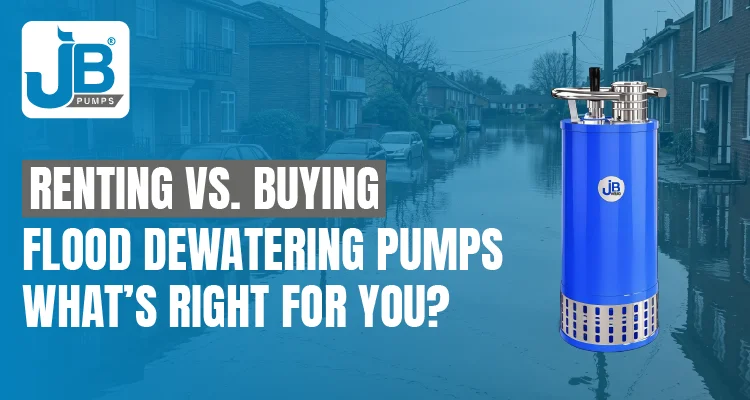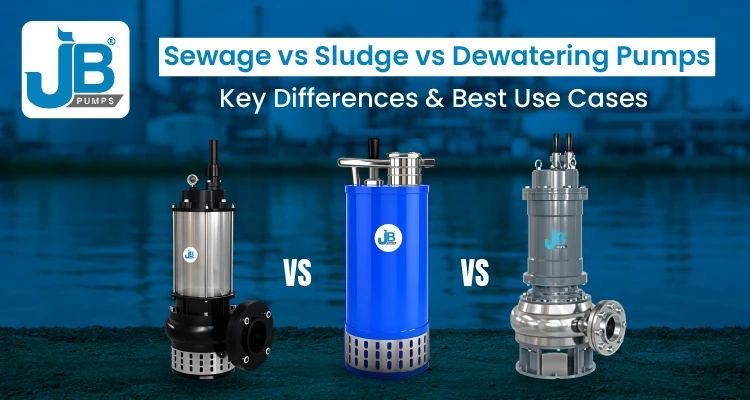
Introduction
When water floods your home, business, or work site, you need to act fast. Making the wrong choice about getting a water pump can cost you thousands of dollars and cause major headaches.
Should I rent or buy a flood water pump? Getting a water pump quickly is super important when dealing with floods. Rent one if you only need it for a short time or emergencies. Buy one if you use it regularly for a long time and have enough money saved up.
Water damage gets stronger every hour, construction jobs get delayed, and businesses can shut down completely. Choosing between renting and buying water removal pumps isn't just about money - it's about having the right pump when disaster hits.
At JB Pumps India, we've seen many situations where people made smart pump choices and saved their properties. We've also seen bad decisions lead to huge losses. This guide will show you exactly when to rent or buy, so you can make the right choice for your situation.
What Are Flood Water Pumps?
Flood water pumps are machines that suck water out of flooded places like basements, construction sites, and buildings. These special water pumps work underwater and can handle dirty water with mud, leaves, and other junk in it.
Different types of pumps:
1. Underwater sewage pumps: Work completely underwater. They're perfect for flooded basements and tight spaces. These pumps can handle solid pieces without getting clogged up.
2. Self-starting pumps: Begin working on their own without you having to do anything special. Cities and businesses like these because they're reliable and easy to use.
3. Thick water pumps: Can handle dirty, thick water with lots of mud and particles. Construction sites need these tough pumps to handle messy water.
4. Slurry pumps: Work with water that has sand, gravel, and other rough materials mixed in. Mining companies and factories use these super-strong pumps.
Getting the right pump is really important for safety, getting the job done right, and protecting the environment. A pump that's too small won't remove enough water. A pump that's too big wastes electricity and costs more money.
When Do You Need a Flood Water Pump?
Emergency flooding is the most serious situation. Natural disasters, broken pipes, and storms can flood your property quickly. You need to remove water fast to avoid damage and health problems.
Seasonal flooding happens to millions of homes and businesses every year. If you live or work near water or in an area that floods often, you need reliable pumps ready to go.
Construction projects need pumps to keep work areas dry. When raising foundations or working underground, you need pumps running all the time to keep water out.
City and factory water management includes moving dirty water to treatment plants and having backup pumps ready for emergencies.
Each situation needs different pump sizes, how long you'll use them, and how much support you need. These factors help you decide whether to rent or buy.
Why Rent Flood Water Pumps?
Good Things About Renting
- Low starting cost means you don't need a lot of money right away. Instead of spending thousands at once, you pay smaller monthly amounts.
- No repair worries because the rental company fixes everything. Professional mechanics keep your pump working perfectly without you needing to know how to fix it.
- Get the newest pumps without worrying about your equipment getting old and outdated. Rental companies have the latest, most efficient pumps available.
- Total flexibility lets you get bigger or smaller pumps as your needs change. Emergency situations benefit from this because you never know exactly what you'll need.
- No storage needed means you don't need warehouse space or worry about theft. The rental company handles storage, moving, and all the logistics.
Bad Things About Renting
- Higher costs over time add up when you need pumps often. If you rent for many months, you might spend more than buying it would have cost.
- Hard to find pumps during busy flood seasons. When lots of people need pumps at once, there might not be enough available, and prices go up.
- Limited customization means you can't modify pumps for special jobs. If you need pumps built for specific chemicals or unusual situations, rentals might not work.
Best Times to Rent
- Rare emergency use makes renting the smart choice. One-time floods don't justify buying expensive equipment you might never use again.
- Short projects under six months usually work better with rentals. Temporary construction jobs and seasonal needs benefit from flexible rental terms.
- Tight budgets might require renting even for longer projects. Monthly rental payments are easier to manage than huge upfront costs.
- Testing equipment before buying reduces your risk. Renting lets you try different pumps to see what works best for your specific needs.
Why Buy Flood Water Pumps?
Good Things About Buying
- Saves money for regular use becomes clear after using pumps for 8-12 months straight. Purchase costs usually equal rental fees within this time.
- Always ready for emergencies gives you peace of mind if you're in a risky flood area. Your own pumps are available instantly without depending on rental companies.
- Complete control lets you modify, upgrade, and customize pumps exactly how you want them. Special features become possible when you own the equipment.
- Business benefits may include tax write-offs and the pump's value as a company asset. Owned equipment can help your business value and financial strength.
Bad Things About Buying
- High upfront cost requires a lot of money at once. Quality water pumps cost anywhere from ₹50,000 to ₹8,00,000 or more.
- You handle all repairs, which means you need technical knowledge and spare parts. Professional repair costs and downtime become your responsibility.
- Storage and security needs add facility costs and theft risks. You need proper storage space and security to protect expensive equipment.
- Technology gets outdated over time. Newer, more efficient pumps come out regularly, making your older pump less efficient and more expensive to run.
Best Times to Buy
- Regular business use justifies buying for construction companies, cities, and factories that need pumps all the time.
- Good cash flow makes buying financially possible. Strong budgets and available money support equipment purchases.
- Technical knowledge in your organization enables proper maintenance. If you have qualified repair people, owning pumps makes sense.
- Good storage space provides secure equipment housing. Proper storage protects your investment and keeps equipment ready when needed.
Cost Comparison—Renting vs. Buying
| Cost Type | Renting | Buying |
|---|---|---|
| Money Needed Upfront | ₹5,000-₹15,000 deposit | ₹50,000-₹8,00,000+ |
| Monthly Costs | ₹8,000-₹30,000/month | Repairs + electricity |
| Maintenance | Included in rental | ₹2,000-₹10,000/month |
| Storage | Not needed | ₹1,000-₹5,000/month |
| Insurance | Rental company pays | You need extra coverage |
| Break-even Point | Never | 8-12 months regular use |
Upfront costs are very different between choices. Rentals need small deposits, while buying requires big investments from ₹50,000 for basic pumps to ₹8,00,000+ for industrial-grade pumps.
Monthly expenses include rental fees, repair costs, and operating costs. Rental fees typically range ₹8,000-₹30,000 monthly depending on pump size and how long you need it.
Hidden costs affect both options. Moving, setup, training, and permits cost money regardless of renting or buying, but they impact your total costs.
Seasonal price changes can increase rental costs 20-40% during busy flood seasons. Buying eliminates this price jump but requires careful planning.
Decision Checklist
✅ How often you'll use the pump - Weekly/monthly use = buy; yearly/emergency use = rent
✅ How long your project lasts - Projects over 12 months usually justify buying
✅ Available money - Tight cash flow might require renting despite higher long-term costs
✅ Repair knowledge - Technical skills affect whether owning makes sense
✅ Storage availability - Secure storage space affects buying decisions
✅ Technology needs - Latest features might favor renting for access to newest models
✅ Risk comfort level - How much equipment failure would hurt influences your choice
Simple Decision Guide: Rent or Buy?
Choose Renting When:
- Need pump for less than 6 months
- Emergency or rare use
- Don't have much money upfront
- No one knows how to fix pumps
- No storage space available
- Technology needs keep changing
Choose Buying When:
- Will use pump for more than 12 months continuously
- Need multiple pumps at same time
- Need special pump features
- Have people who can fix pumps
- Have good storage and security
- Want to save money long-term
Smart Tips for Choosing the Right Pump
Figure out exactly how much water you need to remove including total amount, how fast, and how dirty it is. Guessing wrong leads to poor performance and project delays.
Choose pump type based on your specific job. Pumps that cut through solid waste work differently than regular portable pumps.
Check if your electrical system works with the pump you want. Some big pumps need special three-phase power or specific voltage.
Make sure repair support is available especially if buying. Local service networks and spare parts availability affect long-term ownership costs significantly.
Think about environmental impact and energy efficiency. Modern pumps offer better efficiency, reducing operating costs and environmental impact.
Making the Right Choice for You
Renting works best for emergencies, short-term projects, tight budgets, and when you don't have repair knowledge. The flexibility and service support justify higher per-use costs.
Buying makes sense for regular users, long-term projects, organizations with technical knowledge, and situations needing special pump features. Ownership provides control and long-term savings.
Your decision depends on your specific needs, financial situation, and comfort with risk. Neither option is always better - the right choice matches your unique situation and goals.
Don't let floods catch you unprepared. Whether you rent or buy, having a plan ready saves critical time when water threatens your property.
For expert help with water pumps, sewage pumps, slurry pumps, sludge pumps, dewatering pumps, mud pumps, and rental pump solutions, contact JB Pumps India. Our technical specialists help you choose the best water removal strategy for your specific needs.
Ready to protect your property from flood damage? Contact JB Pumps India today for personalized pump recommendations and cost analysis. Get your custom quote and make sure you're prepared when flood waters rise.



